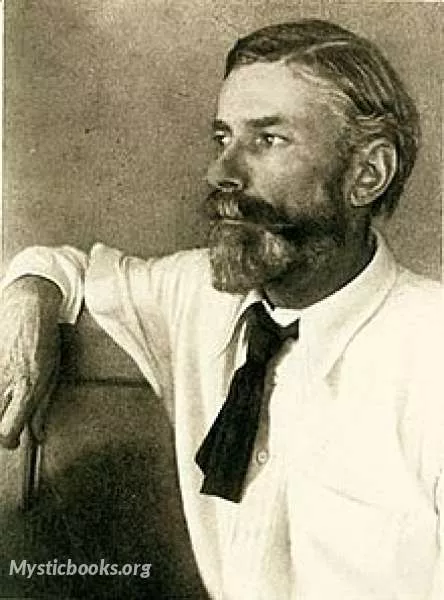
Timeline
Title
Country/Nationality
Edward Carpenter
Edward Carpenter was an English utopian socialist, poet, philosopher, anthologist, an early activist for gay rights and prison reform whilst advocating vegetarianism and taking a stance against vivisection. As a philosopher he was particularly known for his publication of Civilisation: Its Cause and Cure. Here he described civilisation as a form of disease through which human societies pass.
An early advocate of sexual liberation, he had an influence on both D. H. Lawrence and Sri Aurobindo, and inspired E. M. Forster's novel Maurice.
Born at 45 Brunswick Square, Hove in Sussex, Carpenter was educated at nearby Brighton College, where his father was a governor. His brothers Charles, George and Alfred also went to school there. When he was ten, Carpenter displayed a flair for the piano.
His academic ability became evident relatively late in his youth, but was sufficient to earn him a place at Trinity Hall, Cambridge. At Trinity Hall, Carpenter came under the influence of Christian Socialist theologian F. D. Maurice. Whilst there he also began to explore his feelings for men. One of the most notable examples of this is his close friendship with Edward Anthony Beck (later Master of Trinity Hall), which, according to Carpenter, had "a touch of romance". Beck eventually ended their friendship, causing Carpenter great emotional heartache. Carpenter graduated as 10th Wrangler in 1868. After university, he was ordained as curate of the Church of England, "as a convention rather than out of deep Conviction", and served as curate to Maurice at the parish of St Edward's, Cambridge.
In 1871 Carpenter was invited to become tutor to the royal princes George Frederick (later King George V) and his elder brother, Prince Albert Victor, Duke of Clarence, but declined the position. His lifelong friend and fellow Cambridge student John Neale Dalton took the position. Carpenter continued to visit Dalton while he was tutor. They were given photographs of the pair, taken by the princes.
In the following years he experienced an increasing sense of dissatisfaction with his life in the church and university, and became weary of what he saw as the hypocrisy of Victorian society. He found great solace in reading poetry, later remarking that his discovery of the work of Walt Whitman caused "a profound change" in him. Five or six years later he visited Whitman in Camden, New Jersey, in 1877.
Carpenter was voluntarily released from the Anglican ministry and left the church in 1874 and moved to Leeds, becoming a lecturer as part of University Extension Movement, which was formed by academics who wished to widen access to education in deprived communities. He lectured in astronomy, the lives of ancient Greek women and music and had hoped to lecture to the working classes, but found his lectures were mostly attended by middle class people, many of whom showed little active interest in the subjects he taught. Disillusioned, he moved to Chesterfield, but finding that town dull, moved to nearby Sheffield a year later. Here he came into contact with manual workers, and he began to write poetry. His sexual preferences were for working men: "the grimy and oil-besmeared figure of a stoker" or "the thick-thighed hot coarse-fleshed young bricklayer with a strap around his waist".
Drawn increasingly to Hindu philosophy, he travelled to India and Ceylon in 1890. Following conversations with the guru Ramaswamy (known as the Gnani) there, he developed the conviction that socialism would bring about a revolution in human consciousness as well as of economic conditions. His account of the travel was published in 1892 as From Adam's Peak to Elephanta: Sketches in Ceylon and India. The book's spiritual explorations would subsequently influence the Russian author Peter Ouspensky, who discusses it extensively in his own book, Tertium Organum (1912).
On his return from India in 1891, he met George Merrill, a working-class man also from Sheffield, 22 years his junior, and after the Ferneyhoughs left Millthorpe in 1893 Merrill became Carpenter's companion. The two remained partners for the rest of their lives, cohabiting from 1898. Merrill, the son of an engine driver, had been raised in the slums of Sheffield and had little formal education.
In 1902 Carpenter's anthology of verse and prose, Ioläus: An Anthology of Friendship, was published. The book was published again in 1906 by William Swan Sonnenschein.
In 1915, he published The Healing of Nations and the Hidden Sources of Their Strife, where he argued that the source of war and discontent in western society was class-monopoly and social inequality.
Carpenter became an advocate of the Christ myth theory. His book Pagan and Christian Creeds was published by Harcourt, Brace and Howe in 1921.
The death of George Hukin in 1917 at the age of 56 seems to have broken Carpenter's attachment to the North of England. In 1922 he & Merrill moved to Guildford, Surrey and the two lived at 23 Mountside Rd. On Carpenter's 80th birthday he was presented an album signed by every member of the then Labour Government, headed by Ramsay MacDonald, Prime Minister, who Carpenter had known since his teenage years.
In January 1928, Merrill died suddenly, having become dependent on alcohol since moving to Surrey. Carpenter was devastated and he sold their house and lodged for a short time, with his companion and carer Ted Inigan, at 17 Wodeland Avenue, just a short walk from Mountside. They then moved to a bungalow called 'Inglenook' in Josephs Road. In May 1928, Carpenter suffered a paralytic stroke. He lived another 13 months before he died on 28 June 1929, aged 84. He was interred in the same grave as Merrill at the Mount Cemetery in Guildford under a lengthy invocation written by Carpenter.
Books by Edward Carpenter
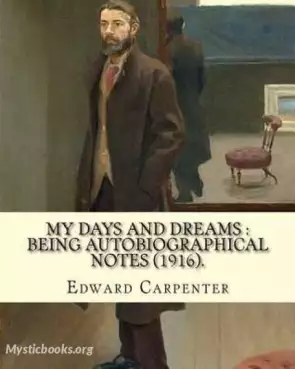
My Days and Dreams
Hard to imagine now, but there have been times and places where just wearing sandals could get you labeled as being in rebellion against established society. Two such places were Berkeley, California in the early 1960s and Millthorpe, England in the...
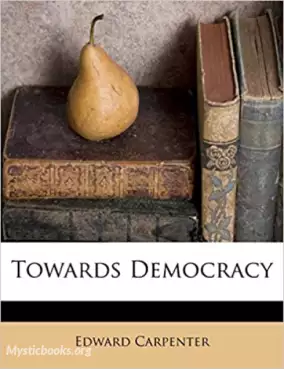
Towards Democracy
“Civilization sinks and swims, but the old facts remain—the sun smiles, knowing well its strength.” Edward Carpenter (1844-1929) wrote his prose poem, Towards Democracy, styled after Walt Whitman’s Leaves of Grass, in a summer burst of creativity. “E...
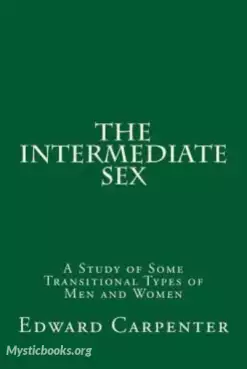
The Intermediate Sex
The Intermediate Sex was a work by Edward Carpenter expressing his views on homosexuality. Carpenter argues that "uranism", as he terms homosexuality, was on the increase, marking a new age of sexual liberation. The work was an influence on Robert Gr...
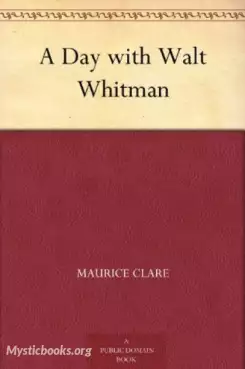
Days with Walt Whitman
"Days with Walt Whitman" is a contemplative summary of the life of Walt Whitman and the making of the poet, by one of his followers. Edward Carpenter collected a half dozen essays he had written about different aspects of the American poet's work and...
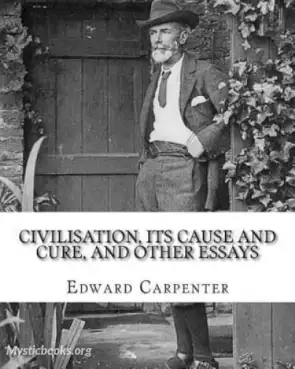
Civilisation: Its Cause and Cure, and Other Essays
This publication, by English utopian socialist Edward Carpenter, describes civilisation as a sort of disease with which humanity is afflicted. Alongside this influential publication (originally published in 1889), are compiled other essays: Modern Sc...
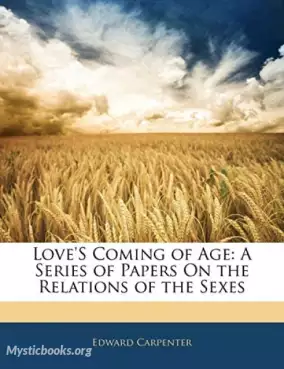
Love's Coming-of-Age: A Series of Papers on the Relations of the Sexes
The book is a series of essays that discuss the social, psychological, and sexual aspects of love and relationships. "Love's Coming-of-Age" is a book written by Edward Carpenter, published in 1896, which explores the relationships between men and wom...
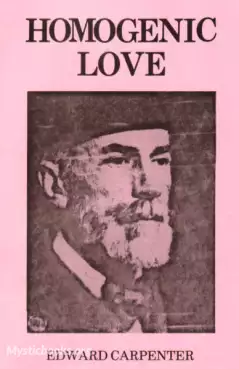
Homogenic Love and Its Place in a Free Society
This pamphlet by LGBT pioneer and philosopher Edward Carpenter was originally intended to form part of his work "Love's Coming of Age", but was removed following public discourse on the Oscar Wilde trials of 1895. It was subsequently published privat...
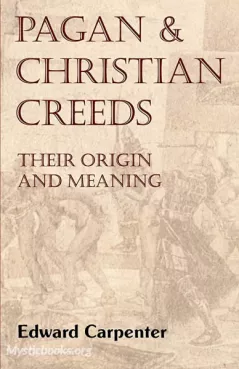
Pagan & Christian Creeds: Their Origin and Meaning
This is a compelling examination of the historical origins and profound significance of pagan and Christian religious creeds. Written by the renowned author Edward Carpenter, this book offers a thought-provoking exploration of the origins, developmen...
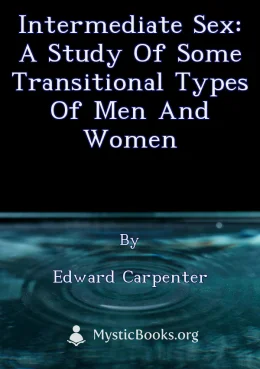
Intermediate Sex: A Study of Some Transitional Types of Men and Women
The Intermediate Sex is a pioneering work on homosexuality that challenges the prevailing social and scientific views of the time. Published in 1908, the book argues for the legitimacy of homosexuality, traces its history, and highlights the signific...